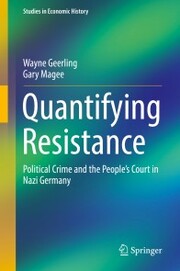-
Zusatztext
-
<p>This book presents and uses a major, new database of the most serious forms of internal resistance to the Nazi state to study empirically the whole phenomenon of resistance to an authoritarian regime. By studying serious political resistance from a quantitative historical perspective, the book opens up a new avenue of research for economic history.</p><p><br></p><p>The database underpinning the book was painstakingly compiled from official state records of treason and/or high treason tried before the German Peoples Court (<i>Volksgerichtshof</i>) between 1933 and 1945. It brings together material on resistance groups stored in the archives of the Federal Republic of Germany and Austria with previously inaccessible files from the former German Democratic Republic, Czechoslovakia and Soviet Union. Through searching these records, the authors have been able to reconstruct in hitherto unattainable detail the economic, social, political, ethnic and familial profiles, backgroun</p>ds, and influences of all 4,378 civilians of the Third Reich active in Germany, Austria and the outside territories for whom there are complete records.<p><br></p><p>The findings of their research afford fresh, new interdisciplinary insights and perspectives, not only on the configuration, timing, impact and profile of resistance to the Nazi state, but also on a range of real-world behaviours common within authoritarian states, such as defection, reward and punishment, and commitment to group identities. The books statistical analysis reveals precisely the who, how, where and when of serious resistance. In so doing, it advances significantly our understanding of the overall pattern and nature of serious resistance within Nazi Germany.</p><p><br></p>
-
-
Kurztext
-
This book presents and uses a major, new database of the most serious forms of internal resistance to the Nazi state to study empirically the whole phenomenon of resistance to an authoritarian regime. By studying serious political resistance from a quantitative historical perspective, the book opens up a new avenue of research for economic history.The database underpinning the book was painstakingly compiled from official state records of treason and/or high treason tried before the German People's Court (Volksgerichtshof) between 1933 and 1945. It brings together material on resistance groups stored in the archives of the Federal Republic of Germany and Austria with previously inaccessible files from the former German Democratic Republic, Czechoslovakia and Soviet Union. Through searching these records, the authors have been able to reconstruct in hitherto unattainable detail the economic, social, political, ethnic and familial profiles, backgrounds, and influences of all 4,378 civilians of the Third Reich active in Germany, Austria and the outside territories for whom there are complete records.The findings of their research afford fresh, new interdisciplinary insights and perspectives, not only on the configuration, timing, impact and profile of resistance to the Nazi state, but also on a range of real-world behaviours common within authoritarian states, such as defection, reward and punishment, and commitment to group identities. The book's statistical analysis reveals precisely the who, how, where and when of serious resistance. In so doing, it advances significantly our understanding of the overall pattern and nature of serious resistance within Nazi Germany.
-
-
Autorenportrait
- <p><b>Wayne Geerling</b> is Senior Lecturer at the University of Arizona, and has previously worked at Pennsylvania State University and La Trobe University in Australia. He has been a visitor to the University of Southern Denmark and Helmut Schmidt University. His research expertise lies in the areas of modern European economic history, and economics education.<br></p><p><br></p><p><b>Gary Magee</b>is Professor of Economics and Deputy Dean (Research) in the Faculty of Business& Economics at Monash University. He has held academic positions at the Australian National University, the University of Melbourne, La Trobe, and the University of London and has had visiting fellowships at the University of Oxford, the Russian Academy of Sciences, the China Development Institute, the University of Leeds, the University of Johannesburg, the University of Stellenbosch, and the Center for the History of American Business, Technology and Society at the University of Delaware. He has publishedwidely in the fields of technological change, economic history and industrial development. In 2001, he was elected a Fellow of the Royal Historical Society in the UK in recognition of his work in economic history.</p><p><br></p>
Detailansicht
Quantifying Resistance
eBook - Political Crime and the People's Court in Nazi Germany, Studies in Economic History
ISBN/EAN: 9789811060083
Umbreit-Nr.: 4616849
Sprache:
Englisch
Umfang: 0 S., 4.05 MB
Format in cm:
Einband:
Keine Angabe
Erschienen am 11.09.2017
Auflage: 1/2017
E-Book
Format: PDF
DRM: Digitales Wasserzeichen


